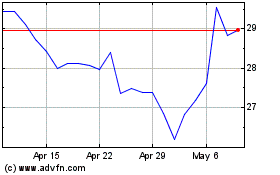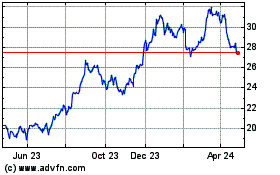UBS to Issue Additional Tier 1 Capital Instrument for Employee Compensation
January 23 2015 - 12:45AM
Business Wire
- Deferred Contingent Capital Plan enhanced to qualify as
additional tier 1 capital
- Supplementary capital return of CHF 0.25 per share following
completion of squeeze-out, fully accrued in the fourth quarter
2014
Regulatory News:
UBS has enhanced certain features of its employee compensation
framework in anticipation of increased focus on tier 1 capital
instruments. Starting with compensation for 2014, Deferred
Contingent Capital Plan (DCCP) awards will qualify as fully applied
additional tier 1 (AT1) capital under Basel III regulations. This
will optimize the capital efficiency of these plans under Basel
III.
DCCP was introduced in 2012 as a key component of UBS's
compensation framework. UBS was the first bank to introduce this
innovative instrument, which is designed to better align the
interests of shareholders, bondholders and employees and to align
compensation incentives with the capital strength of the firm. The
key features of DCCP awarded for the 2013 performance year will be
closely replicated in the AT1 DCCP awards for 2014, which will be
issued by UBS Group AG.
Outstanding DCCP awards granted for the performance years 2012
and 2013 are unaffected by these changes, and continue to qualify
as Basel III tier 2 loss-absorbing capital.
In line with the capital treatment applied to DCCP awards in
prior years, at year-end UBS recognized approximately CHF 500
million in AT1 capital, and deducted approximately CHF 500 million
from fully applied Basel III common equity tier 1 (CET1) capital
through the end of the fourth quarter of 2014. UBS intends to build
approximately CHF 2.5 billion in AT1 DCCP over the next five years
and continues to target a fully applied Basel III CET1 ratio of 13%
and at least 10% post stress.
Reflecting progress in the establishment of its Group holding
company, including the successful completion of its share-for-share
exchange offer, UBS fully accrued a supplementary capital return of
CHF 0.25 per share in the fourth quarter of 2014. The accrual
reduced UBS's fully applied Basel III CET1 capital by approximately
CHF 1 billion as of 31 December 2014. Subject to shareholder
approval, UBS Group AG intends to pay the supplementary capital
return upon successful completion of the squeeze-out procedure. The
supplementary capital return is expected to be a distribution of
capital contribution reserves. It is separate and in addition to
our targeted capital return of at least 50% of net profit
attributable to UBS shareholders.
On 15 January 2015, the Swiss National Bank discontinued the
minimum exchange rate for the Swiss franc versus the euro. This
resulted in considerable foreign exchange volatility. In aggregate,
UBS did not experience negative revenues in its trading businesses
in connection with the announcement. UBS will provide further
information on its outlook for the current quarter with its
fourth-quarter results on 10 February 2015.
Cautionary Statement Regarding Forward-Looking
Statements
This document contains statements that constitute
“forward-looking statements”, including but not limited to
management’s outlook for UBS’s financial performance and statements
relating to the anticipated effect of transactions and strategic
initiatives on UBS’s business and future development. While these
forward-looking statements represent UBS’s judgments and
expectations concerning the matters described, a number of risks,
uncertainties and other important factors could cause actual
developments and results to differ materially from UBS’s
expectations. These factors include, but are not limited to: (i)
the degree to which UBS is successful in executing its announced
strategic plans, including its efficiency initiatives and its
planned further reduction in its Basel III risk-weighted assets
(RWA) and leverage ratio denominator (LRD); (ii) developments in
the markets in which UBS operates or to which it is exposed,
including movements in securities prices or liquidity, credit
spreads, currency exchange rates and interest rates and the effect
of economic conditions and market developments on the financial
position or creditworthiness of UBS’s clients and counterparties;
(iii) changes in the availability of capital and funding, including
any changes in UBS’s credit spreads and ratings, or arising from
requirements for bail-in debt or loss-absorbing capital; (iv)
changes in or the implementation of financial legislation and
regulation in Switzerland, the US, the UK and other financial
centers that may impose more stringent capital (including leverage
ratio), liquidity and funding requirements, incremental tax
requirements, additional levies, limitations on permitted
activities, constraints on remuneration or other measures; (v)
uncertainty as to when and to what degree the Swiss Financial
Market Supervisory Authority (FINMA) will approve reductions to the
incremental RWA resulting from the supplemental operational
risk-capital analysis mutually agreed to by UBS and FINMA, or will
approve a limited reduction of capital requirements due to measures
to reduce resolvability risk; (vi) the degree to which UBS is
successful in executing the announced creation of a new Swiss
banking subsidiary, a US intermediate holding company, changes in
the operating model of UBS Limited and other changes which UBS may
make in its legal entity structure and operating model, including
the possible consequences of such changes, and the potential need
to make other changes to the legal structure or booking model of
the UBS group in response to legal and regulatory requirements,
including capital requirements, resolvability requirements and
proposals in Switzerland and other countries for mandatory
structural reform of banks; (vii) changes in UBS’s competitive
position, including whether differences in regulatory capital and
other requirements among the major financial centers will adversely
affect UBS’s ability to compete in certain lines of business;
(viii) the liability to which UBS may be exposed, or possible
constraints or sanctions that regulatory authorities might impose
on it, due to litigation, contractual claims and regulatory
investigations; (ix) the effects on UBS’s cross-border banking
business of tax or regulatory developments and of possible changes
in UBS’s policies and practices relating to this business; (x)
UBS’s ability to retain and attract the employees necessary to
generate revenues and to manage, support and control its
businesses, which may be affected by competitive factors including
differences in compensation practices; (xi) changes in accounting
or tax standards or policies, and determinations or interpretations
affecting the recognition of gain or loss, the valuation of
goodwill, the recognition of deferred tax assets and other matters;
(xii) limitations on the effectiveness of UBS’s internal processes
for risk management, risk control, measurement and modeling, and of
financial models generally; (xiii) whether UBS will be successful
in keeping pace with competitors in updating its technology,
particularly in trading businesses; (xiv) the occurrence of
operational failures, such as fraud, unauthorized trading and
systems failures; and (xv) the effect that these or other factors
or unanticipated events may have on our reputation and the
additional consequences that this may have on our business and
performance. The sequence in which the factors above are presented
is not indicative of their likelihood of occurrence or the
potential magnitude of their consequences. Our business and
financial performance could be affected by other factors identified
in our past and future filings and reports, including those filed
with the SEC. More detailed information about those factors is set
forth in documents furnished by UBS and filings made by UBS with
the SEC, including UBS’s Annual Report on Form 20-F for the year
ended 31 December 2013, updated information prepared in connection
with the exchange offer included in UBS’s Report on Form 6-K filed
with the SEC on 29 September 2014 and UBS’s Third Quarter 2014
Report on Form 6-K filed with the SEC on 28 October 2014. UBS is
not under any obligation to (and expressly disclaims any obligation
to) update or alter any forward-looking statements set out in this
document, whether as a result of new information, future events, or
otherwise.
UBS Group AG and UBS AGInvestor
contactSwitzerland:+41-44-234 41 00orMedia
contactSwitzerland:UK:Americas:APAC:+41-44-234 85 00+44-207-567 47
14+1-212-882 58 57+852-297-1 82 00www.ubs.com
UBS (NYSE:UBS)
Historical Stock Chart
From Mar 2024 to Apr 2024

UBS (NYSE:UBS)
Historical Stock Chart
From Apr 2023 to Apr 2024
